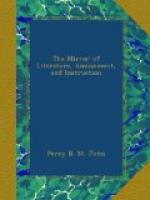are very liable to disease, more especially inflammation
of the bowels, asthma, epilepsy, and soreness of the
bill. No animal deviates so far from the simplicity
of nature in its habits, as man; none is placed under
the influence of so many circumstances, calculated
to act unfavourably upon the frame. His morbid
affections are hence abundant and diversified, as
may be seen by referring to the different nosological
arrangements; these long catalogues of diseases affording
strong evidence that man has not carefully followed
that way of life which has been marked out for him
by nature. The crowded state of the inhabitants
of large cities; the injurious effects of an atmosphere
loaded with impurities; sedentary occupations; various
unwholesome avocations; intemperance in food; stimulating
drinks; high-seasoned and indigestible viands (and
these taken hastily in the short intervals allowed
by the hurry and turmoil of business); the constant
inordinate activity of the great central circulation,
kept up by the double impulse of luxurious habits
and high mental exertions; the violent passions by
which we are agitated and enervated; the various disappointments
and vexations to which all are liable, reacting upon
and disturbing the whole frame; the delicacy and sensibility
to external influences, caused by heated rooms, too
warm clothing, and other indulgencies; are all contrary
to the voice of nature, and they produce those morbid
conditions of the system which a more simple and uniform
mode of living would prevent. Our associates of
the animal kingdom do not escape the influence of
such causes: the mountain shepherd and his dog
are equally hardy, and form an instructive contrast
between a delicate lady and her lap-dog; the extreme
point of degeneracy and imbecility of which each race
is susceptible. In the early ages of society
man enjoyed long life, his manner of living was simple,
his food, habitation, and pursuits, were all calculated
to fortify the body, and no anxious cares disturbed
his mind.
Curtis’s Essay on the Deaf and Dumb.
* * * *
*
REFORM OF CRIMINAL LAW.
How noble and pure was the ambition of Sir Samuel
Romilly we may learn from the following beautiful
passages, where he has explained the motives by which
he was actuated in his proposed reforms of the criminal
law. “It was not,” said he, “from
light motives—–it was from no fanciful
notions of benevolence, that I have ventured to suggest
any alteration in the criminal law of England.
It has originated in many years’ reflection,
and in the long-established belief that a mitigation
of the severe penalties of our law will be one of the
most effectual modes to preserve and advance the humanity
and justice for which this country is so eminently
distinguished. Since the last session of parliament,
I have repeatedly reconsidered the subject: I
am more and more firmly convinced of the strength of




